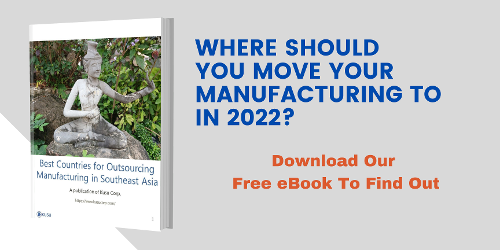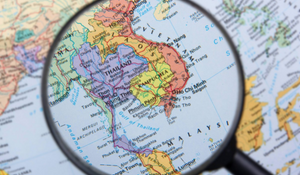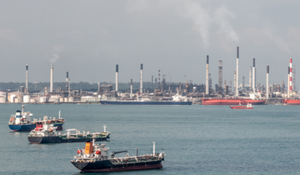The country with the largest manufacturing of semiconductor chips, Taiwan, is an important partner...
Why Hong Kong Matters In 2022
The Hong Kong protests of the past few years caught the attention of many around the world. The implications the protests have on domestic Chinese politics and regional politics is wide ranging. In this week’s article, we will be discussing the situation in Hong Kong.
More specifically, we will be discussing the history of Hong Kong, the “One country, two systems” framework, the extradition bill and resulting protests, the response from Beijing towards the protests, and the response from foreign countries towards Beijing’s initial response.
%20(9).png?width=600&name=Untitled%20(600%20%C3%97%20350%20px)%20(9).png)
History of Hong Kong
According to History.com, Hong Kong came under Chinese control in the 3rd Century BC, during the reign of the Qin Dynasty. The island came under British rule during the Opium War, the conflict which began as a result of the British illegally smuggling opium into the country.
The war took place between 1839-1842 and led to the cessation of Hong Kong, as well as Kowloon and the New Territories by 1842. An official lease was agreed between the British and the Chinese in 1898 which allowed the British to lease the aforementioned territories for ninety-nine years.
The BBC adds, between 1946-1997, the Hong Kong economy grew exponentially through the development of its textile and manufacturing industries. This would last until 1997 after Thatcher announced the island’s relinquishment to Chinese authorities in 1984, save for the brief period during the Second World War when Hong Kong would fall to the Japanese.
“One Country, Two Systems”
CSIS defines the “One Country, Two Systems” framework as “...a grand compromise: in exchange for Britain’s peaceful return of Hong Kong, China agreed to create a corpus separatum from the mainland for Hong Kong. Beijing promised, ‘the current social and economic systems in Hong Kong will remain unchanged, and so will the life-style’ for 50 years.”
“Hong Kong and its residents would retain political freedoms and a market economy. The agreement vested the new Hong Kong Special Administrative Region with a mini-constitution of Basic Laws and a semi-independent government of three branches…” The framework was initially proposed in 1984 and included in the 1984 deal that guaranteed the relinquishment of Hong Kong.
The framework has since faced numerous tests. It previously came under scrutiny when Beijing permitted reforms which would allow the direct election of the island’s chief executive, under the condition the candidates would be chosen by Beijing. This led to the 2014 Umbrella Revolution.
Extradition Bill and Resulting Protests
The Umbrella Revolution only gained more momentum following the 2019 Extradition Bill. The Bill was initially proposed in response to an individual charged with murder in Taiwan who then fled to Hong Kong, writes VOX.
According to the BBC, the Bill would alter the previously established precedent: That individuals charged under Hong Kong law could not be extradited to the mainland. The Bill would change this precedent and allow foreign countries, including the mainland, which Hong Kong does not have special extradition treaties to request extradition.
This is a troubling prospect as it could mean that activists in Hong Kong, and dissidents in general, could be extradited to the mainland and placed in great harm. Mass protests broke out in opposition to the Bill. Thousands took to the street and mass unrest occurred for months.
Response from Beijing
According to the South China Morning Post, amidst the protests, five key demands were made by activists: 1) Withdrawal of Extradition Bill; 2) Inquiry into police brutality; 3) Retracting the classification of protesters as “rioters''; 4) Amnesty for those arrested; and 5) Universal suffrage for the Legislative and the Executive. These demands were not met kindly.
As a result, approximately 4,500 protesters were arrested by the end of 2019 alone, reports VOX. Key targets of the pro-Beijing Carrie Lam Administration and the Hong Kong Police Force were opposition news outlets, journalists, activists, and dissidents. Additionally, the Lam Administrations delayed the legislative election and executive election, reports Reuters.
The Administration also passed the National Security Law in response to the unrest on the island. The Diplomat writes that the most severe changes brought about by the Law include: 1) The abolishment of independent media; 2) Targeting of journalists; 3) Growth of mainland media; 4) Greater internet surveillance; and 5) Removal of effigies of Tiananmen.
Response from Foreign Countries
Many foreign countries responded to the new law with caution and scepticism. Al-Jazeera wrote that Japan felt the measure underestimated the “One Country, Two Systems” framework. The UK will look into how it affects UK-Chinese relations.
On the other hand, then-US Secretary of State described the legislation as “draconian.” The EU President stressed the risks to Chinese public perception brought about by the legislation. Even Taiwan called them out for it and 27 countries published a joint statement at the UNHRC.
Nikkei states the recent crackdowns have led to a widespread brain in Hong Kong which continues to worsen even amidst the worldwide COVID-19 pandemic and the resulting travel restrictions. The vacuum left by the brain drain is increasingly filled by mainland academics and professionals which is also equally worrying.
Conclusion
Evidently, the Hong Kong situation is borne from a long and storied history. The implications of “One country two systems,” the extradition bill, and Beijing’s response, as well as foreign countries’ responses towards Beijing, is wide-ranging.
We, at Kusu believe that the crackdown on Hong Kong protest is symptomatic of the Chinese regime’s incompatibility with western values. However, this is not the case with Southeast Asia. Hence, we argue that Southeast Asia is the prime destination for any and all manufacturing needs you and your company may have.
-1.jpg?width=146&height=50&name=Kusu%20(1)-1.jpg)



